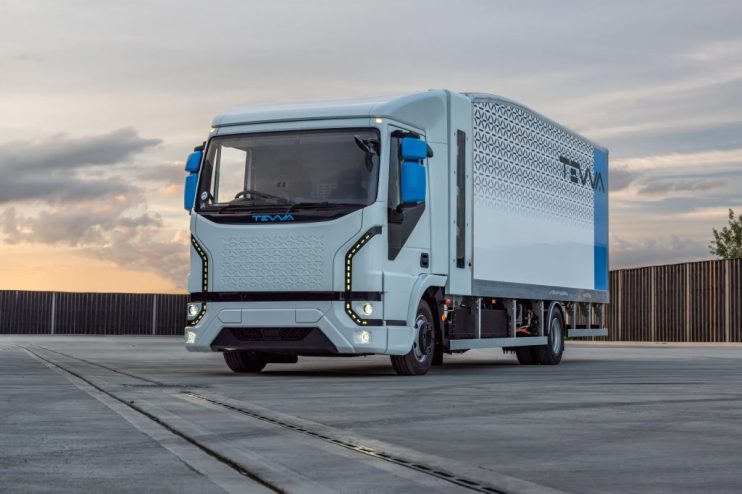Landmark day: Essex ‘scale-up’ unveils first hydrogen HGV to be mass-produced in UK

Essex-based “scale-up” Tevva made automotive history today when it unveiled the first hydrogen HGV mass-produced in the UK.
Fitted with a hydrogen-fuel cell system in addition to its electric battery, the 7.5-tonne lorry is able to carry heavy loads over long distances, driving as far as 310 miles.
“By embracing hydrogen, we are futureproofing ourselves, our clients and the industries and communities they operate in,” said Tevva’s boss Asher Bennett.
The chief executive explained that while the lorries rely mainly on the battery, adding a hydrogen-fuel cell system will remove concerns that the trucks could run out of power.
“No fleet operator is going to put out a truck in the morning that is going to get anywhere near the limits of its range,” Bennett added.
“Which means putting an electric truck on a much shorter range than it could have done.”
The hydrogen tank is refuelled by filling it with hydrogen gas, in a way similar to petrol or diesel vehicles.
The tank feeds into a cell system that generates electricity, which in turn tops up the electric motor when needed.
Commenting on the news, transport minister Trudy Harrison said: “UK-based manufacturers like Tevva continue to build on the skills and expertise we have in hydrogen in the UK, developing new technologies, supporting economic growth, and working towards net zero.”
Tevva, which since its foundation has raised $140m in funding, was not as impacted by the supply chain issues such as the shortage of semiconductors that continues to rampage through the global automotive industry.
Bennett told City A.M. Tevva’s low capex manufacturing model allowed it to “be a bit more flexible.”
“If there are issues around the supply chain, we’re solving them one by one,” he said in late May. “Because we’re not building a very large giga-factory-size facility, our production capabilities [can be] flexible.”
After a 12-month trial with UPS, Tevva announced it will manufacture more than 200 trucks this year, ramping up production of its latest model from 2023 onwards.
“When it’s running at full capacity we’ll be at 3,000 trucks a year and we’re expecting to reach that level towards the end of next year,” Bennett explained.
“[But] we’re gonna go beyond that, as our intention is to open a facility in Europe, followed by facilities in the US.”